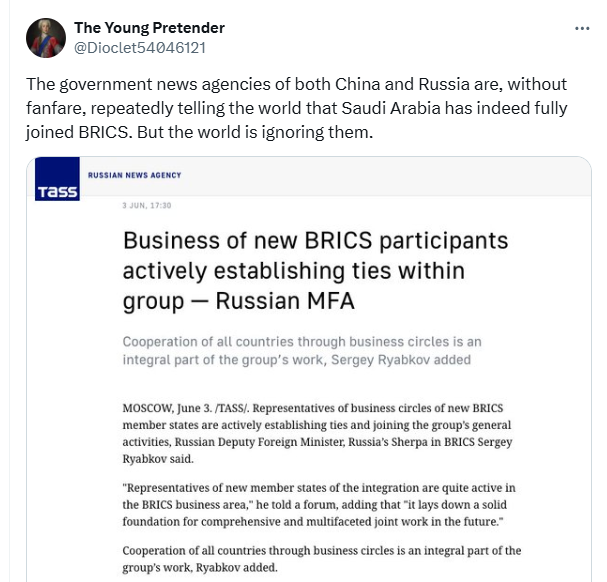06
Jun
Could Black Swan Event Lead to the End of the Dollar?
The term "petrodollar" emerged in the 1970s when the United States struck a deal with Saudi Arabia. This agreement (view original New York Times news story) ensured that oil transactions would be conducted exclusively in U.S. dollars. Consequently, other oil-producing nations followed suit, cementing the dollar's dominance in global oil trade. This system created a steady demand for the U.S. dollar, boosting its value and solidifying its position as the world's primary reserve currency.
Benefits for the U.S. Dollar
The petrodollar system has provided significant benefits to the U.S. economy. It created a constant global demand for the U.S. dollar, bolstering its value. In addition, countries holding large reserves of dollars typically invested them in U.S. assets, such as Treasury bonds, facilitating lower interest rates and helping finance the U.S. debt, since these things were easy to buy with their dollars. Additionally, this system supported the U.S. dollar's role as the world's reserve currency, providing the U.S. with unparalleled economic leverage and influence.
Risks from Shifting Trends
Recently, the BRICS nations (Brazil, Russia, India, China, and South Africa) have been exploring alternatives to the U.S. dollar for international trade, including oil transactions. If more countries follow this trend, it could significantly reduce the global demand for the dollar. Such a shift would potentially decrease its value, increase borrowing costs for the U.S., and diminish its economic influence. This change could also lead to greater volatility in exchange rates and affect global economic stability.
A recent post on X points to a news release by the Russian news agency TASS that seems to state that additional member states are in the process of joining the BRICS alliance.

The petrodollar has historically been a cornerstone of U.S. economic strength, but shifting geopolitical trends pose risks to its future stability. It's already well-recognized that "de-dollarization" is in progress on other fronts, so for those interested in the global economy and currency markets, these developments are crucial to watch.
Rumored Black Swan Event and Potential Impact on the Petrodollar
Unconfirmed online reports have circulated broadly this week, warning of a potential "Black Swan Event" occurring between June 9-11. The rumors suggests that the agreement between the United States and Saudi Arabia to sell Saudi oil exclusively in U.S. dollars is set to expire on June 9, 2024. It is alleged that the Saudi Prince has already notified the U.S. that this agreement will not be renewed and that Saudi Arabia will no longer accept USD for oil sales.
While this information remains unverified, the implications of such a shift could be profound, potentially leading to significant changes in the global financial landscape. The possibility of such an event has already driven many buyers to add to their precious metals holdings, and if an event like this were to happen, it is likely that many more people holding U.S. dollars would be clamoring to convert their fiat currency for gold. Such a spike in demand could drive gold to record highs and beyond.
Evidence of Saudi Arabia moving away from using the U.S. dollar for oil transactions has been gaining traction recently. One notable development is Saudi Arabia's participation in a trial led by the Bank for International Settlements (BIS) focusing on central bank digital currencies (CBDCs). This initiative indicates a broader interest in diversifying away from traditional financial systems dominated by the U.S. dollar. See the original Reuters news story on this topic.
Saudi Arabia's involvement in the BIS-led CBDC trial suggests a willingness to explore alternative currencies for international trade. The introduction of CBDCs could provide a more efficient and secure method for conducting transactions, potentially reducing the reliance on the U.S. dollar. If Saudi Arabia, one of the world's largest oil producers, starts accepting payments in digital currencies or other fiat currencies, it could significantly impact the demand for the U.S. dollar in global oil markets.
This shift aligns with the broader trend among BRICS nations, which have been actively seeking alternatives to the U.S. dollar for trade. By participating in the CBDC trial, Saudi Arabia is positioning itself to adapt to potential changes in the global financial landscape. Such a move would not only affect the U.S. economy but also alter the dynamics of international trade and finance, emphasizing the importance of monitoring these developments closely.
In this post on X, investment advisor Jaime Carrasco also pointed out that the 50 year-old Petrodollar deal is set to expire.

Benefits for the U.S. Dollar
The petrodollar system has provided significant benefits to the U.S. economy. It created a constant global demand for the U.S. dollar, bolstering its value. In addition, countries holding large reserves of dollars typically invested them in U.S. assets, such as Treasury bonds, facilitating lower interest rates and helping finance the U.S. debt, since these things were easy to buy with their dollars. Additionally, this system supported the U.S. dollar's role as the world's reserve currency, providing the U.S. with unparalleled economic leverage and influence.
Risks from Shifting Trends
Recently, the BRICS nations (Brazil, Russia, India, China, and South Africa) have been exploring alternatives to the U.S. dollar for international trade, including oil transactions. If more countries follow this trend, it could significantly reduce the global demand for the dollar. Such a shift would potentially decrease its value, increase borrowing costs for the U.S., and diminish its economic influence. This change could also lead to greater volatility in exchange rates and affect global economic stability.
A recent post on X points to a news release by the Russian news agency TASS that seems to state that additional member states are in the process of joining the BRICS alliance.

The petrodollar has historically been a cornerstone of U.S. economic strength, but shifting geopolitical trends pose risks to its future stability. It's already well-recognized that "de-dollarization" is in progress on other fronts, so for those interested in the global economy and currency markets, these developments are crucial to watch.
Rumored Black Swan Event and Potential Impact on the Petrodollar
Unconfirmed online reports have circulated broadly this week, warning of a potential "Black Swan Event" occurring between June 9-11. The rumors suggests that the agreement between the United States and Saudi Arabia to sell Saudi oil exclusively in U.S. dollars is set to expire on June 9, 2024. It is alleged that the Saudi Prince has already notified the U.S. that this agreement will not be renewed and that Saudi Arabia will no longer accept USD for oil sales.
While this information remains unverified, the implications of such a shift could be profound, potentially leading to significant changes in the global financial landscape. The possibility of such an event has already driven many buyers to add to their precious metals holdings, and if an event like this were to happen, it is likely that many more people holding U.S. dollars would be clamoring to convert their fiat currency for gold. Such a spike in demand could drive gold to record highs and beyond.
Evidence of Saudi Arabia moving away from using the U.S. dollar for oil transactions has been gaining traction recently. One notable development is Saudi Arabia's participation in a trial led by the Bank for International Settlements (BIS) focusing on central bank digital currencies (CBDCs). This initiative indicates a broader interest in diversifying away from traditional financial systems dominated by the U.S. dollar. See the original Reuters news story on this topic.
Saudi Arabia's involvement in the BIS-led CBDC trial suggests a willingness to explore alternative currencies for international trade. The introduction of CBDCs could provide a more efficient and secure method for conducting transactions, potentially reducing the reliance on the U.S. dollar. If Saudi Arabia, one of the world's largest oil producers, starts accepting payments in digital currencies or other fiat currencies, it could significantly impact the demand for the U.S. dollar in global oil markets.
This shift aligns with the broader trend among BRICS nations, which have been actively seeking alternatives to the U.S. dollar for trade. By participating in the CBDC trial, Saudi Arabia is positioning itself to adapt to potential changes in the global financial landscape. Such a move would not only affect the U.S. economy but also alter the dynamics of international trade and finance, emphasizing the importance of monitoring these developments closely.
In this post on X, investment advisor Jaime Carrasco also pointed out that the 50 year-old Petrodollar deal is set to expire.

For a confidential consultation with one of our Metals Portfolio Experts about how to protect your assets from the falling value of the U.S. dollar, please submit the following form.



